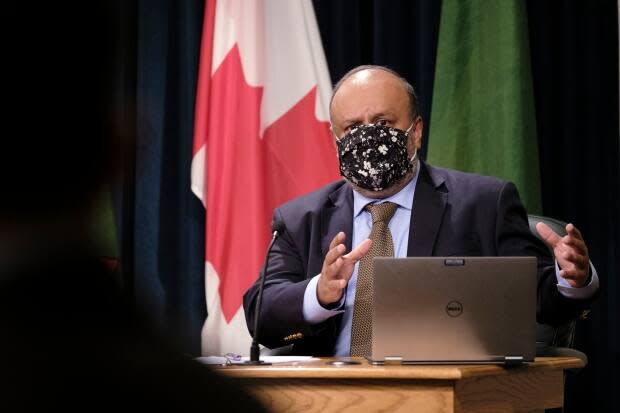Vaccines have been more than 99% effective against COVID-19 in Sask., top doctor says

The doctor leading Saskatchewan's fight against COVID-19 is pointing to new data that suggests vaccines have been tremendously effective in keeping people living in the province from getting infected.
In an analysis conducted up to May 8, researchers found that out of the 309,276 Saskatchewan residents who received a single dose of COVID-19 vaccine up to and including April 17, only 263 became infected with the coronavirus more than three weeks later.
That amounts to a "breakthrough rate" of 0.085 per cent.
"The vaccine effectiveness is 99 per cent and higher," Chief Medical Health Officer Dr. Saqib Shahab said during a COVID-19 briefing on Tuesday.
"This is quite remarkable, actually. That's just one dose. The vaccine is protecting us so well."
Tuesday's disclosure was the first data of its kind to emerge from Saskatchewan about "breakthrough" infections in vaccinated people. So far, the province has inoculated residents with the Pfizer-BioNTech, Moderna and AstraZeneca vaccines.
Shahab said the findings reinforce the need for all Saskatchewan residents to get vaccinated and follow up with a second dose.
But one statistician said Shahab was wrong to conflate the breakthrough rate and the vaccine effectiveness rate and that Shahab's doing so may inadvertently deter people from seeking a second dose of COVID-19 vaccine.
Maxime Turgeon, an assistant professor in the department of statistics at the University of Manitoba who is currently living in Saskatchewan, said the two rates are calculated differently and should not be used interchangeably.
"The bigger picture here is that if this efficiency is so high after one dose, then I'm worried that people will be less inclined to have a second dose," Turgeon said. "And so I think there's an issue there in terms of communication and then vaccine hesitancy as well."
In response to Turgeon's concerns, the Ministry of Health noted that Shahab has repeatedly mentioned during news conferences the importance of getting a second dose.
Saskatchewan is aiming to fully vaccinate all residents by the end of July, at which point it's hoped the province will be in the third and final step of its plan to gradually lift or ease public health measures enacted in the last year to prevent the spread of COVID-19.
That plan sets out various vaccination benchmarks before rules can be relaxed, based on single-dose vaccination targets.
At least one of Shahab's counterparts has confirmed her province will not echo Saskatchewan's plan.
"We do need to look at a number of different factors, so it's not going to be just based on immunization, but that will be one of the important factors," Bonnie Henry, B.C.'s provincial health officer, said earlier this week.
Saskatchewan Premier Scott Moe has said elements of the reopening plan may be put on pause if there's a concerning spike in cases or hospitalizations.
On Tuesday, in the wake of vaccine efficacy data, Moe called on the federal government to come forward as quickly as possible with advice on what people can and can't do once they're fully vaccinated.
"I suspect many Canadians are going to be asking the same questions of the federal government," Moe said.
"If I travel abroad to a certain country, what are the requirements with respect to quarantine, testing? On my return to Canada, should those [requirements] be the same for someone that is unvaccinated versus someone that is vaccinated?
"We would ask them to provide some guidance."

 Yahoo Movies
Yahoo Movies 